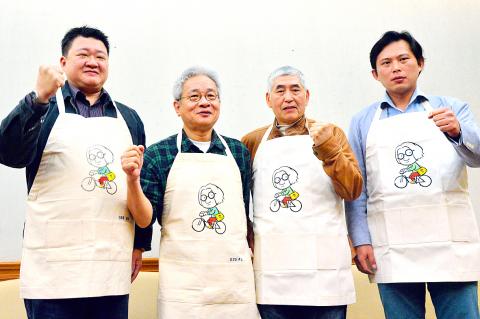Award-winning author and former Taipei mayoral candidate Neil Peng (馮光遠) yesterday announced his candidacy for next year’s legislative election, saying he does not rule out the possibility of following in Taipei Mayor Ko Wen-je’s (柯文哲) footsteps of joining the opposition party’s primary.
A day after the election to recall Chinese Nationalist Party (KMT) Legislator Alex Tsai (蔡正元) failed, Peng, who played a part in the Appendectomy Project — a movement birthed during the Sunflower movement last year to recall unfit lawmakers — declared that he would join the legislative race.
Peng is to vie for the electoral district encompassing New Taipei City’s Tamsui (淡水), Bali (八里), Linkou (林口), Shimen (石門), Sanjhih (三芝) and Taishan (泰山) districts, where he is expecting to confront incumbent KMT Legislator Wu Yu-sheng (吳育昇), whom Peng also tried to have recalled, but failed.

Photo: CNA
Film director and antinuclear power activist Ko I-chen (柯一正) voiced his support for Peng.
“It’s not that we are born rebellious, we have been forced to stand up by how the politics has turned out,” Ko said. “Many have promised to make Taiwan better, but all they have done is serve certain groups of people and strip our children of their assets.”
“When we call for fairness and justice, if it is not aimed for the reforms to the social structure, only a minority of people would be benefited,” Peng added.
Academia Sinica researcher Huang Kuo-chang (黃國昌), who had a leading role in the Sunflower movement and has been pushing for a lower threshold for national referendums, was also at the press conference to show his support for Peng.
“We have observed [since the Sunflower movement] how wide the gap is between social power and the legislature, which has passed so many bills that should never have been passed. These include the amendment to the Accounting Act (會計法), which was clearly intended for the decriminalization of certain politicians. It also failed to pass progressive bills that should have been passed, such as the cross-strait agreement oversight mechanism,” Huang said.
Huang added that both the ruling and opposition parties have pledged to create legislation to prevent media monopolization, “but nothing has been drawn up.”
“What do we have at our disposal to fight against them when they betray us?” asked Huang.
New Taipei City Councilor Ho Po-wen (何博文), who was elected by the same constituency, said the area is a “difficult place” in which to defeat the ruling party, and called on young district voters to assist Peng’s campaign.
When asked whether he would be willing to cooperate with the Democratic Progressive Party by joining its primary, as Ko Wen-je did for his Taipei mayoral election, Peng responded in the affirmative, “but only if their candidates have good policies and a strong will to defend democracy.”
He also announced his withdrawal from the Taipei City Government’s Clean Government Commission “to clear up any doubts of a conflict of interest.”

The manufacture of the remaining 28 M1A2T Abrams tanks Taiwan purchased from the US has recently been completed, and they are expected to be delivered within the next one to two months, a source said yesterday. The Ministry of National Defense is arranging cargo ships to transport the tanks to Taiwan as soon as possible, said the source, who is familiar with the matter. The estimated arrival time ranges from late this month to early next month, the source said. The 28 Abrams tanks make up the third and final batch of a total of 108 tanks, valued at about NT$40.5 billion

Travel agencies in Taiwan are working to secure alternative flights for travelers bound for New Zealand for the Lunar New Year holiday, as Air New Zealand workers are set to strike next week. The airline said that it has confirmed that the planned industrial action by its international wide-body cabin crew would go ahead on Thursday and Friday next week. While the Auckland-based carrier pledged to take reasonable measures to mitigate the impact of the workers’ strike, an Air New Zealand flight arriving at Taipei from Auckland on Thursday and another flight departing from Taipei for Auckland on Saturday would have to

A group from the Taiwanese Designers in Australia association yesterday represented Taiwan at the Midsumma Pride March in Melbourne. The march, held in the St. Kilda suburb, is the city’s largest LGBTQIA+ parade and the flagship event of the annual Midsumma Festival. It attracted more than 45,000 spectators who supported the 400 groups and 10,000 marchers that participated this year, the association said. Taiwanese Designers said they organized a team to march for Taiwan this year, joining politicians, government agencies, professionals and community organizations in showing support for LGBTQIA+ people and diverse communities. As the first country in Asia to legalize same-sex

MOTIVES QUESTIONED The PLA considers Xi’s policies toward Taiwan to be driven by personal considerations rather than military assessment, the Epoch Times reports Chinese President Xi Jinping’s (習近平) latest purge of the Chinese People’s Liberation Army (PLA) leadership might have been prompted by the military’s opposition to plans of invading Taiwan, the Epoch Times said. The Chinese military opposes waging war against Taiwan by a large consensus, putting it at odds with Xi’s vision, the Falun Gong-affiliated daily said in a report on Thursday, citing anonymous sources with insight into the PLA’s inner workings. The opposition is not the opinion of a few generals, but a widely shared view among the PLA cadre, the Epoch Times cited them as saying. “Chinese forces know full well that